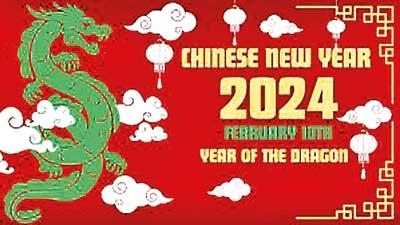Reply To:
Name - Reply Comment
The Chinese Lunar New Year (Spring Festival) dawned on Saturday the 10th of February. The year 2024 is special as it is recognized as a world holiday for the first time by the UN, and since China is celebrating the 75th anniversary of the founding of the Peoples’ Republic. The year 2024 will be the “Year of the Dragon.” In China, the “Dragon” (“Loong”) culture has a history of approximately 5,500 to 7,000 years.
since China is celebrating the 75th anniversary of the founding of the Peoples’ Republic. The year 2024 will be the “Year of the Dragon.” In China, the “Dragon” (“Loong”) culture has a history of approximately 5,500 to 7,000 years.
Cultural & Spiritual Heritage
Analyzing the history similarities between the Chinese, Sinhala and Tamil civilizations can be mapped. The records of the first Chinese new year celebration can be traced to 4th century BC. During the Qin dynasty, it evolved into the practice of cleaning homes at the end of winter. This festival is known as the ‘Spring Festival’, as it marks the end of winter and the beginning of spring. Similar to the Vesak lanterns and illuminations during Diwali, the ‘Lantern Festival’ is held on the 15th day of the year (the 1st day of the Chinese New Year falls between 21st January and 20th February).
After cleaning their homes to sweep away ill fortune, they decorate windows and doors with red paper, expecting good fortune. The Chinese who invented gun powder use it to light fire crackers and fire bamboo to chase evil spirits. They gift money in red envelopes to make others happy, honour deities and ancestors, and serve pepper wine to parents wishing them good health.
During the Han dynasty, they started the tradition of visiting the homes of others wishing each other a Happy New Year. During the Jin dynasty, people started the tradition of staying up all night on New Year’s Eve until sunrise. The Chinese who invented ‘paper’ started the tradition of sending New Year greeting cards during the Tang dynasty.
night on New Year’s Eve until sunrise. The Chinese who invented ‘paper’ started the tradition of sending New Year greeting cards during the Tang dynasty.
Offering ‘year cake’ started during the Yuan dynasty, and offering dumplings was introduced during the Ming dynasty. The tradition of family reunion still remains an important feature, and its contribution to Chinese and world economies is noteworthy.
Economic Contribution
As per Chinese transport statistics, approximately 195.24 million passenger trips were handled by China’s transportation sectors on 9th February alone (an increase of 26.7% from the same day in 2023). Highway traffic was 184.62 million passenger trips (an increase of 24.2% -Year-on-Year). Train traffic increased by 98.8% to 8.257 million trips, and air trips increased by 137.7% to 1.797 million trips. Travel by water increased by 11.9% to 566,000 trips. Approximately two million people travelled in 17,500 flights on the 9th of this month alone. This indicates the rising quality of life of the Chinese.
Global Celebrations
Due to people to people links, the event is celebrated in the Korean republics, Vietnam, Cambodia, Laos and even at Okinawa in Japan where the USA maintains a military base since dropping the atomic bomb in 1945 despite objections from the local populations. The Chinese and their friends in Singapore, Indonesia, Malaysia, Myanmar, Philippines, Thailand, Australia, Canada, New Zealand, Peru, South Africa, the EU, UK & USA also celebrate the event.
The Belt & Road Initiative (BRI) is helping its partners to build roads, railways, sea and airports, etc. globally. China’s outward direct investment has exceeded USD 240 billion during the 2013–2022 period. Those who don’t wish to see China rising as a world leader may paint pictures of the Chinese Dragon breathing fire polluting the Earth, but the impartial should know that in 2023, being an inspiration to the world, China has invested approximately USD 890 billion in clean energy which is equal to total global investments in fossil fuel supply. The world should know that it’s a new Dragon (loong) which doesn’t wish to dominate or subjugate. It is the Dragon seeking win-win cooperation for the benefit of humanity.
“The Year of the Dragon” is upon us. The Dragon symbolizes Energy, Wisdom, Protection & Good Luck. We need these qualities to rise up to today’s global challenges. May the Dragon remind us of our ability to create a more promising future for our own families and the greater human family on the planet we all call home” - António Guterres (UN Secretary General).
The Author of this article was a postgraduate researcher at the Kennedy School at Harvard & Queen Elizabeth House at Oxford. He was the principal resource person of the ‘Belt & Road’ radio program aired on China Radio International (SL). He served the United Nations in six conflict affected countries & focuses on utilizing China’s 21st Century Silk Road (Belt & Road) initiative for conflict resolution & prevention.